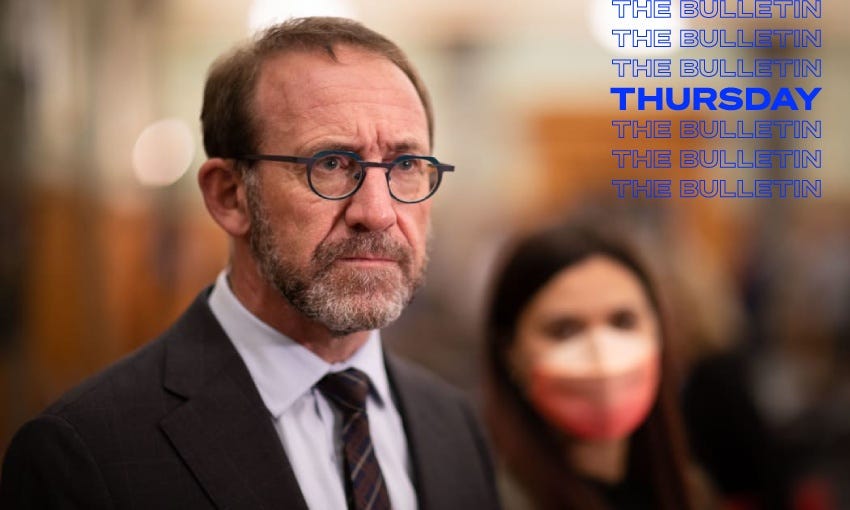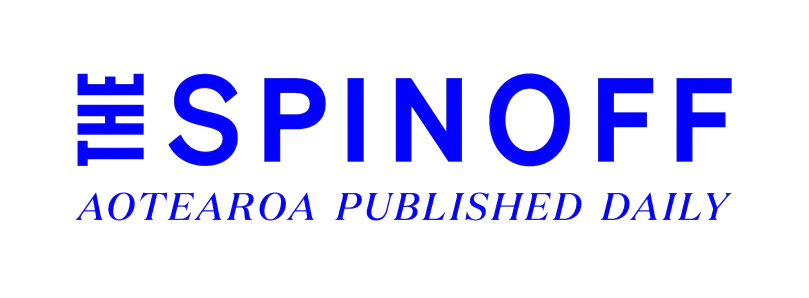Long-awaited Pharmac review released
After 27 years of operating without review, Pharmac has been told that its days as “the independent republic of Pharmac” are over.
Mōrena and welcome to The Bulletin for Thursday, June 2, by Anna Rawhiti-Connell. Presented in partnership with Z Energy.
In today’s edition: Christchurch stadium cost increase; vote on $200m rugby deal today; Catholic church publishes abuse figures; but first, a review of Pharmac finds room for substantial improvement.
Andrew Little calls time on lack of collaboration from Pharmac (Photo: RNZ/Angus Dreaver)
Health minister Andrew Little releases Pharmac review
Commenting on the review, Little said Pharmac “needs to be working appropriately with the rest of the health administration”. The review made 33 recommendations and the government has accepted most of them. The review found the agency’s performance needed to “substantially improve” and that its approach had "in all likelihood" contributed to Māori and Pacific people receiving a lower share of new medicines funded over the last decade. Lung cancer drug funding is often cited as an example of inequity. Its incidence and mortality rates are four times higher for Māori and Pacific people but New Zealand has lagged behind countries like Australia and Japan in funding lung cancer drugs.
Pharmac accepts the findings
In response to the review, health and patient advocates say radical action is needed urgently to tackle the delays patients face in getting the latest drugs. According to RNZ, Pharmac declined to be interviewed about the review but sent a statement. "There are important improvements for us to make and we look forward to working with other health agencies on implementing the recommendations supported by the government" the statement said. Little said Pharmac could adapt over the two years it would take for the health reforms to bed in. The review acknowledged that the Pharmac team were skilled, and recognised the difficult commercial environment it was operating in. The review panel was chaired by former Consumer NZ head, Sue Chetwin.
27 years too long to wait for a review
The review was a 2020 election promise from Labour and the government has been criticised for several delays in completing and releasing it, the first of its kind since the agency was set-up. The review summary notes that 27 years is too long to wait for a first review. That lag probably reflects a lack of public visibility. Most of us don’t connect a trip to the chemist for subsidised antibiotics with the agency. As many submitters told the review panel, interacting with Pharmac and its decision-making becomes all too real when you’re dealing with a debilitating or life-threatening illness.
Demands for greater transparency heard
Over recent years, patients, health professionals and advocacy bodies have become more vocal about unfunded treatments for cancer and rare disorders and delays between recommendations and funding. As Kathy Spencer writes for NZ Herald (paywalled) a particular treatment for breast cancer was first recommended by Pharmac's advisory committee in 2014 but wasn't funded until 2019. RNZ’s Guyon Espiner undertook a four-part investigation into Pharmac in 2019 uncovering a kind of Dallas buyers club for unfunded lung cancer medication and third world diabetes treatment. His second story for the series was about Pharmac’s “secret list” which left patients in the dark about when medicine might be funded. One of the review’s key recommendations was that greater transparency was required from Pharmac over processes, decision-making and the provision of information for the public.
Together with New Zealand Trade and Enterprise, The Spinoff Podcast Network is proud to announce the launch of Going Global, a six part pop-up series in the Business is Boring feed. The series is hosted by Brianne West, founder and CEO of international beauty brand Ethique, and Business is Boring’s Simon Pound. Join Simon and Brianne as they chat to Laura Bell from SafeStack Academy to discuss everything from the export market for digital products to how SafeStack Academy found itself helping world-class companies like Sky, TradeMe and ASB with their cyber security training. Listen to Going Global on The Spinoff Podcast Network. (Sponsored)
Christchurch stadium to cost nearly $700m
As Stuff’s Steven Walton reports, Christchurch mayor Lianne Dalziel “gasped” when she heard the figure. The new cost is $200m more than its initial budget and has been attributed to the increase in construction costs caused by global supply chain issues and the war in Ukraine. The stadium’s opening date has also been pushed to April 2026. The council will consult the public on what should be done next, giving them three options: increase the budget and take on risks of further cost increase, scale back the project or halt the project. Talking to residents, RNZ reports that people are split on what should be done. City councillors also have differing views. Council staff said that if the budget increase was approved a significant increase in rates could be needed to bridge the cost gap.
Rugby deal set to be signed today
The $200m deal between New Zealand Rugby (NZR) and US investment firm Silver Lake is being voted on today in Auckland. It’s been in the making for two years and tension about the deal has played out very publicly. Stuff’s Richard Knowler has an outline of what the deal could mean and why NZR wants it done. The deal would see NZR selling a percentage (5.71% to 8.58%) of its commercial rights to Silver Lake in exchange for at least $200 million in cash. It’s expected that Silver Lake will use its influence to push into the US market and grow the All Blacks brand there before the men's and women's world cups are held in the US in 2031 and 2033.
The Spinoff wouldn’t exist today without the generous support of our members.
If you want to support what we do, please consider joining up. There is no minimum to donate and you’ll not only help make local journalism happen but gain a bunch of great member-only perks, including a world version of The Bulletin, written by Peter Bale, delivered direct to your inbox every Thursday, less advertising, an RSS feed, cool merch and more. Join today!
1680 reports of abuse made to Catholic church between 1950 and 2021
The research published by the church includes records of parishes, schools and care institutions. Three quarters of the abuse took place before 1990. Most of the abuse alleged against priests and brothers was for sexual harm of children, while allegations against sisters and nuns was for physical, emotional or psychological abuse and/or neglect. Liz Tonks, a spokesperson for a network of survivors of abuse in faith based institutions, said the breakdown of figures from the Catholic Church provided no surprise and that “what survivors needed to see was not a commentary of the figures but a statement of the specific action the church was taking as a result”.
Got some feedback about The Bulletin, or anything in the news? Get in touch with me at thebulletin@thespinoff.co.nz
All the ads, autoplay videos and annoying guff peppered between every paragraph – why does online journalism look so terrible? Duncan Greive takes us on a tour of the egregious examples he's collected and asks if there's a better way. Toby Manhire wrings some meaning from this week's two political polls. Charlotte Muru-Lanning talks to Dr Ocean Mercier about the place and importance of mātauranga Māori. Hana Pera Aoake profiles artist Fiona Pardington as she prepares to launch her first NFT project. And Alex Casey meets the Tauranga local who's become the star of reality TV’s best franchise.
Formal complaints laid over behaviour of Invercargill cycling coach
You might recall seeing Sid Cumming’s name in the Bulletin the other week. He’d been quoted in a story from last December about Cycling New Zealand (CNZ) closing regional development hubs, saying “If people can get away from worrying about the outcomes, and look after people, everything else flows along.” The Otago Daily Times’ Daisy Hudson is investigating allegations of bullying and bad behaviour made about Cumming. Cumming was the development coach for CNZ’s Invercargill hub from 2016 until CNZ closed it in March. He secured new funding to reopen the hub and got CNZ’s endorsement which has now been suspended. Cumming has denied the allegations.
Shipping news
A long read for you from Kathryn Schulz at the New Yorker on what happens to items in containers when the containers fall off the ships carrying them at sea, or the ships sink. It starts with lego dragons on the shores of Cornwall’s southern coast and ends with this about a 1997 sinking off the coast of the Isles of Scilly: “Residents and beachcombers kept coming across some of the cargo: a million plastic bags, headed for a supermarket chain in Ireland, bearing the words ‘Help protect the environment’.”













I'm looking at "The Spinoff" as it was reference in the Rachel Smalley/Pharmac incident which the Herald has blocked. But I cannot find it here, either??? As a newby, I may be looking for it the wrong way. Anyone?